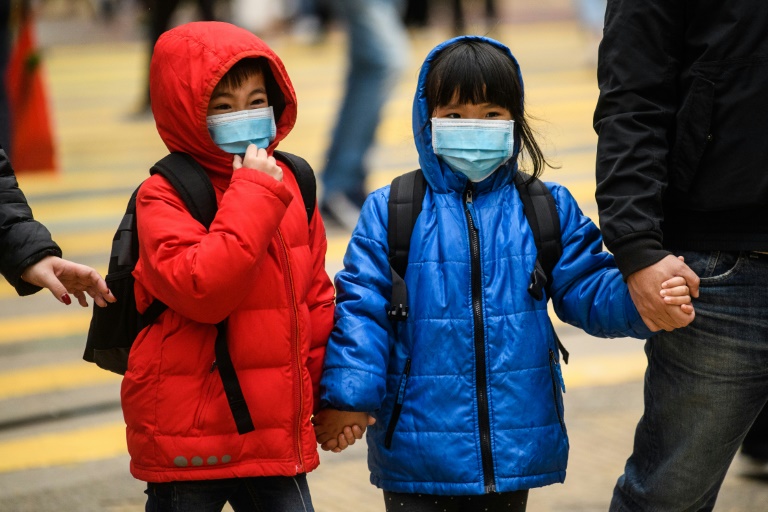
In Japan, some companies have allowed parents to bring children to work during school closures © AFP / CHARLY TRIBALLEAU
Tokyo, Japan, Mar 9 – When Mayumi Iijima heard that schools across Japan would close over the new coronavirus outbreak, leaving her to juggle her job and two small children, her first reaction was horror.
“I just said ‘no, no, no, no… what are we supposed to do?’” the 40-year-old, who works in human resources in Tokyo, told AFP.
Like parents from Italy to Iran, Iijima is struggling to find ways to entertain and educate her children during school closures that the UN says have disrupted education for more than 290 million students worldwide.
In Japan, Prime Minister Shinzo Abe shocked the nation and dismayed parents countrywide with his call for schools to close through the spring holiday, which ends around early April.
Nurseries and after-school clubs can stay open, but Iijima’s nine-year-old son Torao and eight-year-old daughter Koto are both affected.
Iijima’s husband has little flexibility at work, but her company Jinjibu has allowed her to bring the children in, setting aside a conference room and encouraging other staff to help out.

In Hong Kong, schools have been closed for weeks and will remain shut until after Easter © AFP/File / Anthony WALLACE
“What we as a business could do was not to isolate working mothers,” said spokeswoman Junko Sato.
“When they work, they can focus on working, and the rest of our staff will care for the children,” she said.
Iijima is grateful, but says the situation is still far from ideal.
“We brought study materials for children. They also like crafts,” she said.
But she adds: “I hope school will resume. I’m worried about their studies.”
– ‘Easier to concentrate’ –
In Hong Kong, schools have been shut since early February, with the closure now set to last until after Easter.

In Hong Kong, some teachers are offering students lessons online during the closure © AFP / ISAAC LAWRENCE
Many teachers are turning to conference call applications to interact with students, but that requires good WiFi access and computer literacy.
Primary school teacher Billy Yeung works at a school where many students come from low-income families and parents are often unsure how to download documents.
“Some parents told me they don’t have WiFi at home,” he said.
“One told me that they have used up their mobile data by downloading teaching materials.”
Elsa Wong, a single mother, is trying to home school her 11-year-old son Rick, who has attention deficit hyperactivity disorder.
She has enjoyed seeing his progress up close and says her son has generally been more relaxed at home.
But going it alone has been tough, said Wong, whose employer has required staff to work from home.
“Sometimes I have been so physically exhausted or mentally drained, I really couldn’t reason with him.”

Schools across Asia have shut down over the outbreak of the new coronavirus, leaving parents to juggle work and childcare © JIJI PRESS/AFP/File / STR
For some children in the city’s highly competitive system, the closures come as a relief.
“I feel like it is easier to concentrate and it’s less stressful,” said 14-year-old Leo, who normally has nine lessons a day, but now has only two 45-minute sessions via a video-chat app.
– ‘Play Nintendo for ages!’ –
In South Korea, schools are closed at least through March 23, and archivist Han Ji-hee is relying on her husband, mother and niece to watch her two sons.
“I really hate it,” said Han, who lives in Suwon, south of Seoul. “The kids are really bored — they can’t go outside to the playground or hang out with their friends, so they have nothing to do.”
“They just end up watching TV and playing with their phones all day, but it’s not like I can be there.”
The closures are not universal, and in Singapore the government has so far declined to shutter schools, arguing it would “disrupt many lives.”

In Tokyo, popular neighbourhoods like Shibuya and Harajuku are crammed with teenagers during the school closures © AFP/File / CHARLY TRIBALLEAU
“Even if all students stay at home, there is no guarantee against infection,” the education ministry said.
In Tokyo, popular areas like Harajuku and Shibuya are packed with teenagers, with younger children flocking to playgrounds.
“My mother sits next to me all morning so I have no choice but to do homework,” one nine-year-old boy told AFP as he played on a seesaw at a park.
“But the one good thing is that I can play Nintendo Switch for ages,” he said, adding that his family’s usual 45-minute rule had been scrapped.
“Now I can play as long as I like!”
burs-sah/ric/ind









































